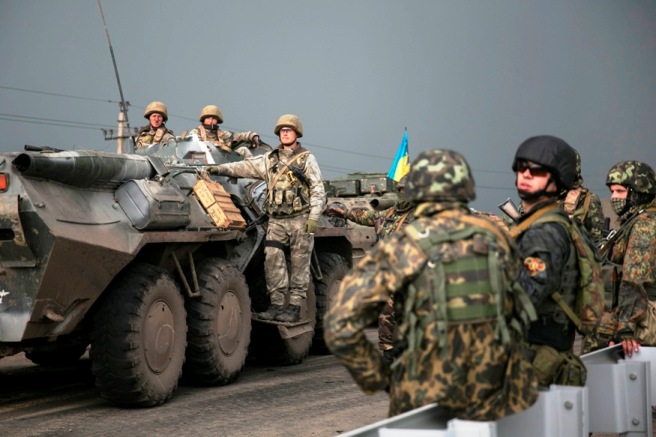Alwaght- World leaders announced on Thursday a cease-fire to the violence in eastern Ukraine.
The cease fire announcement came after marathon talks between the European leaders of Russia, Ukraine, France and Germany in the Belarusian capital Minsk.
Despite the breakthrough, Merkel said "great hurdles will be lying in front of us."
"I have no illusion — we have no illusion: A lot, lot of work is still needed," the German leader said.
According to the AP, one of the hurdles appeared in Putin's statement, that he and the President of Ukraine still disagreed on how to end the ongoing conflict around the key transport hub of Debaltseve.
In geopolitical terms Ukraine matters little to the U.S. in terms of security, stability, prosperity, and democracy. As long as Ukraine remains a militarily and economically weak state with no strategic resources, its ability to affect the U.S. in any way will remain marginal at best.
In contrast, Russia matters much more than Ukraine, whether it, Russia, is weak or strong, friendly or hostile. Although its economy is in a shambles and its population is in decline, Russia is a regional power that is actively enhancing its military capabilities. It is a huge state that occupies a pivotal position between Europe and Asia. It has a seat on the United Nations Security Council and possesses a vast array of nuclear weapons. Besides, it possesses large reserves of two of the world’s most important strategic resources, oil and gas.
When relations with Russia deteriorate somewhat—to the point that Moscow interferes with the West’s pursuit of its interests—Ukraine takes on potential tactical importance for the West. The United States and Europe can then use Ukraine to counterbalance or, more precisely, to signal their displeasure with Russian behavior by including Kiev in Western peacekeeping missions or in diplomatic initiatives in the United Nations, OSCE, and other international or regional institutions. When relations with Russia deteriorate to the point that a hostile Russia becomes a strategic threat to the West, Ukraine acquires immediate strategic importance for the United States and Europe. Under such conditions, Ukraine is not just a useful counterbalance to Russia but a central component of the West’s strategic defense against Russia.
Ukraine’s newfound strategic important to the West has several implications for Western policy toward Ukraine. Ukraine can defend the West against Russia only if Ukraine can defend itself against Russia right now and has the economic and political capacity to generate a political system that can defend itself against instability in the long term. In other words, Ukraine needs to have an army strong enough to deter further Russian attacks and it needs to have an economy strong enough to sustain a strong military.
According to Reuters, U.S president Obama considers rising calls at home for sending U.S. lethal aid to Ukraine, but European leaders fear that would only worsen the fight.
Certainly sending U.S. lethal aid to Ukraine is not the policy that helps to bring peace eventually. This is adding kerosene to burning fires. Where this policy has worked where the United States has sent mass amounts of weapons to an organization or to a government or to what we describe as rebel groups and the result has been peace and stability? Almost always it results in greater civil wars. And now we see the US is looking to send arms to Ukraine which will only serve to solidify the regime in Kiev but will do nothing to promote any type of peace.
Taking look at American policy since 9/11, we will see one blunder after another, all mischaracterized as an attempt to install democracy, to promote stability and peace. This is what is seen throughout the Middle-East, as a result of American intervention, has been more chaos, more bloodshed and more instability.
It is no surprise that the US is the largest arms merchant in the world. By some estimates it provides three quarters of the world’s arms. So the U.S. is a factory that war torn countries are its best customers.
There are several reasons for the U.S. to embark on resolving various crises around the world by sending arms to them. One of course is the money. This provides billions of dollars every year to the American arms industry; an industry that by some estimates is the second largest US export.
John J. Mearsheimer, a professor of political science at the University of Chicago and contributor to the New York Times, believes it is "wrong" to arm Ukraine. "Going down that road would be a huge mistake for the United States, NATO and Ukraine itself. Sending weapons to Ukraine will not rescue its army and will instead lead to an escalation in the fighting. Pushing a nuclear-armed Russia into a corner would be playing with fire," he writes.
The American side tireless attempts to strengthen the conflict in the European house will note stop especially that the trade between the United States and the Russian Federation does not exceed $ 10 billion, and NATO's eastward sneaking is still underway toward Russia's borders.
In view of this, the head of the Russian National Security Council Nikolai Patrushev said earlier that Washington is using the events in Ukraine to draw Russia into a global conflict, and in order to weaken and dismantle Russia.
Observers confirm that the advent of Merkel to Putin after a year of intransigence to try to containment Ukrainian fire is a victory for the latter. In addition, the Kremlin has succeeded in driving a wedge between Europe and Washington, who was excluded by Moscow from performing the role of a mediator.
Tactically, thanks to Franco-German initiative, Putin is winning time, anyway, waiting for the on the verge Ukrainian economy to collapse, which sooner or later will lead to a new outbreak against the Ukrainian authorities.
However, the biggest victory Putin was when Merkel and Hollande said that Ukraine has no place in NATO, as well as in the European Union.



























